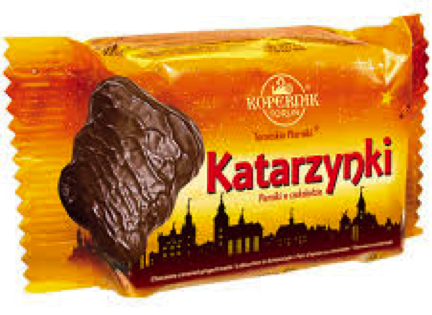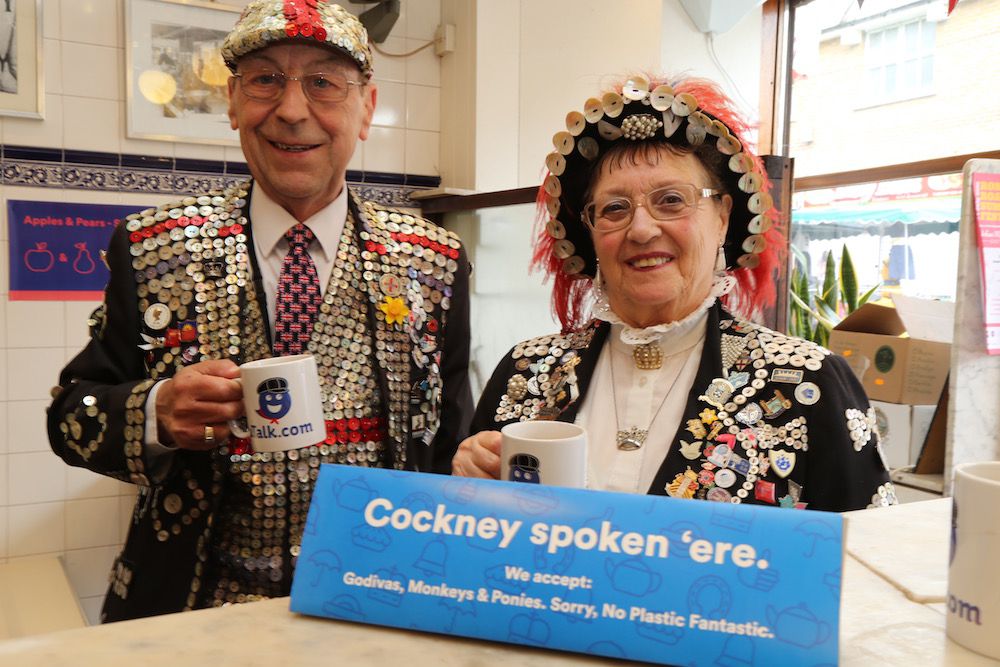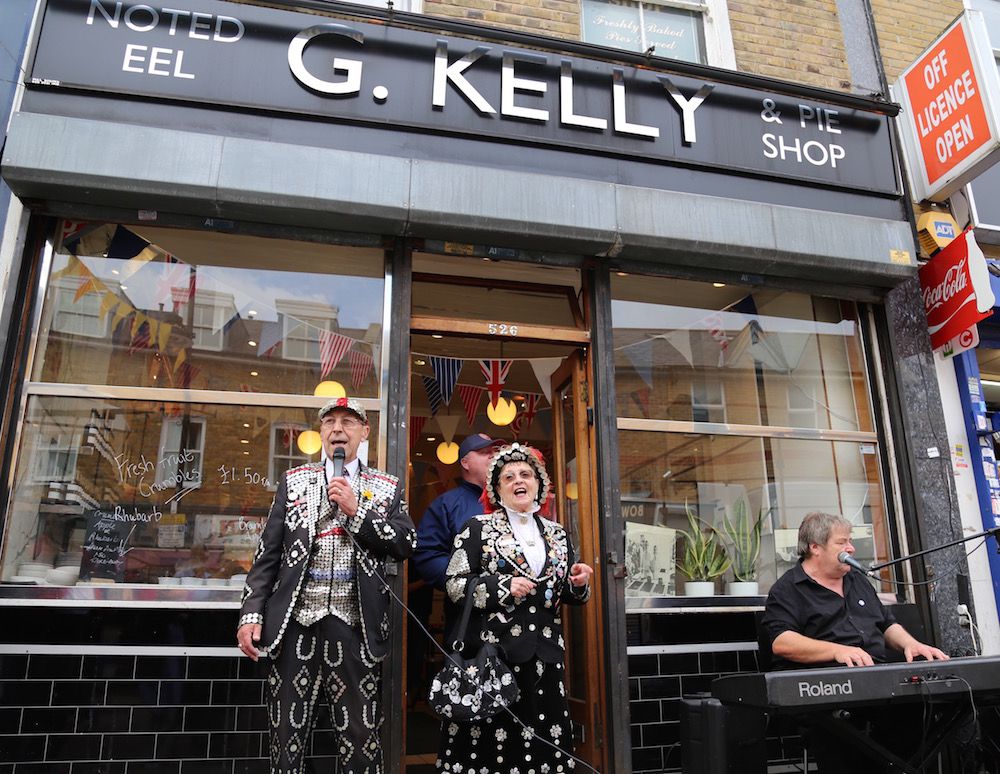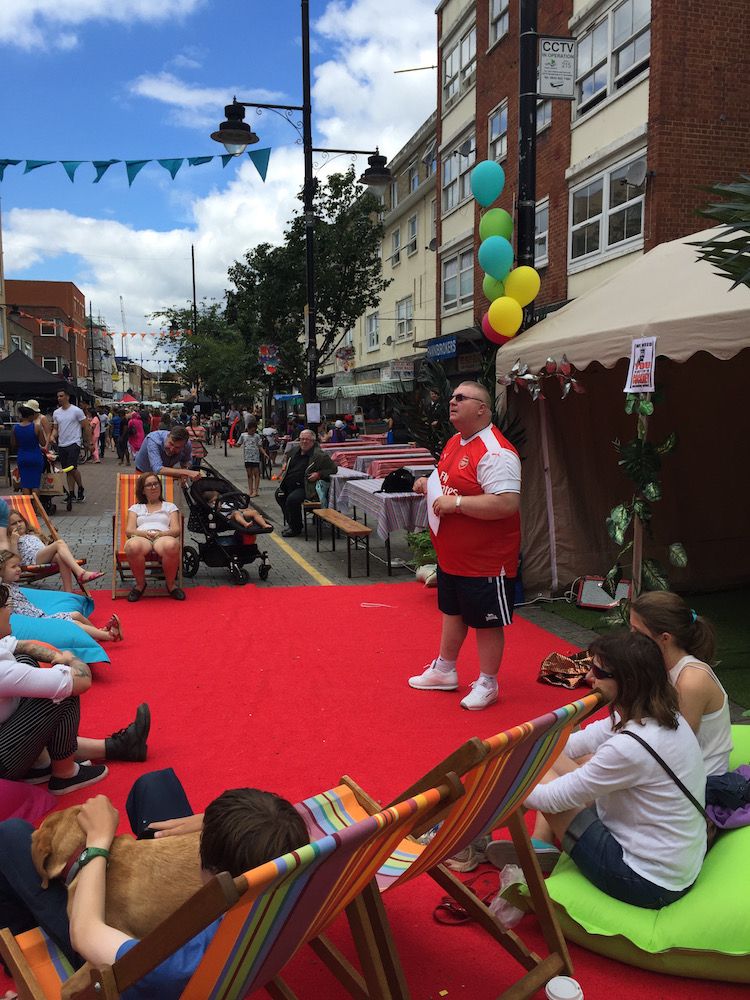uTalk Cockney launches in the East End
If you follow us on Facebook or Twitter, you’ll know that last week uTalk became the world’s first Cockney language learning app! The traditional East London rhyming slang was launched at G Kelly pie shop on the Roman Road by the Pearly King of Forest Gate and Pearly Queen of Old Kent Road.
The Pearly King and Queen learned how to use the app, and were impressed!

Some children from Olga Primary School popped in to put the uTalk app to the test. They had fun playing the games, and were keen to show our chairman Dick what they’d learnt.
And we finished with a good old-fashioned East End knees up, led by our Pearly King and Queen, pianist Mick Yarrow and the voice of uTalk Cockney, Patrick Mackervaie.
It was a fantastic day – thank you to everyone who got involved. Check out our video for more!
Our launch even made the news! As well as a feature on ITV London News on Thursday evening, our language expert Nat appeared on London Live with chairman Dick to talk about the app, and was interviewed with actor Patrick by Robert Elms on Friday morning for BBC Radio London (listen from 1 hour 40 mins onwards).
On Sunday we were back in the East End, giving Cockney lessons to visitors at the Roman Road Summer Festival. Patrick, who’s from Hackney, got the crowd warmed up with some Cockney quizzes (some harder than others), before inviting everyone to come and have a go with the app.
Want to have a go yourself? We’re giving away uTalk Cockney with the Evening Standard – and you get a free month’s subscription to all 133 other languages as well! Just visit eveningstandard.co.uk/offers to get started.
Enjoy! And we’d love to hear what you think – we know Cockney is constantly changing, and that not everyone has the same way of saying things. Email us at mycockney@utalk.com or tweet us with #myCockney to join the discussion!
A few of our favourite things…
Today is a big day here in the UK, as we’re voting in a referendum to decide our future in the European Union. A lot’s been said on both sides of the debate, so we won’t repeat any of the arguments for or against Brexit.
Instead, lets focus on the rich and fascinating cultures of both the UK and Europe. And who better to ask about their favourite things about them than our lovely staff?
Our colleagues from overseas have come up with some interesting things they love about the UK:
Nikolay (Bulgaria) – I ♥ British humour and specifically panel shows! Can’t get enough of “Mock the Week”, “QI”, “Would I Lie to You?”, “Have I Got News for You” etc.
Pablo (Spain) – People’s politeness and patience. In crowded places like in the centre, underground or the streets full of cars, is where you can notice it the most. The only way you can survive from bursting into a full crisis is with both qualities. I really really love that.
Sandra (Poland) – For me it is the Sunday roast, and fish and chips. Living with a lovely bunch of friends who love to cook means that I get to discover some great British dishes, and also that I love to have gravy with almost every meal!
Aditya (India) – I enjoy the British weather, in particular that I love the rain and cloudy weather! Originating from Delhi and having also lived in Dubai, I am rather fed up of the heat/sun.
Ioana (Romania) – Before I came to Britain I thought the idea of tea and milk is disgusting. Now I’ll have a cuppa if I’m sad, happy, with friends, by myself, in the morning or in the evening, there is just something incredibly comforting in a hot cup of tea. Especially on rainy days.
And here are some thoughts from our British colleagues…
Brett – I think the obvious one here is pizza!
Phil – European beaches are the best 🙂
Simon – I visited the Sagrada Familia on my recent trip to Barcelona, and it is an absolutely incredible building, with exceptional architecture.
Safia – I love Italian hot chocolate, you can eat it with a spoon!
Liz – The pain au chocolat… it’s a miraculous culinary invention that brightens up the dullest morning…!
Over to you! Brits – what do you love about Europe? And non-Brits, what’s your favourite thing about the UK? 🙂
Going back to my roots to learn Polish
Alex Koszykowska is the newest member of the EuroTalk team, joining us last month as our new sales and marketing assistant. In today’s post she explains why she’s learning Polish.
It is said that a million people in the UK class Poland as their ancestral home in some way. This is the case for my family; my Granddad came to England from Poland during the second world war (my Gran also came over to England but from Russia – she and my Granddad met when she was a nurse in the army). Over the years my Gran has adapted to my Granddad’s ways, and will now only speak Polish or very basic English to us. Growing up, my dad and his brothers were all brought up speaking Polish as their main language, with English as their second. Even today they can slip into Polish very naturally – leaving my sister and I completely oblivious to what was going on around us. My mum and aunties all learnt to speak Polish – mainly to get brownie points from my Gran; but really it is only my sister, my cousins and I who cannot speak Polish in our family.
This means regularly at our family’s favourite restaurant (which of course is owned by a Polish family), we would be pretending to understand what everyone was talking about.Whenever we entered the hotel, I would always greet the family with ‘Cześć’ (hi). My sister and I have also mastered how to say ‘Dziekuje ci bardzo’, which means ‘thank you very much’ (and rolls off the tongue much more easily then you think it would). We have managed to get away with this throughout our childhood. However, now I feel a certain responsibility to carry on this tradition in our family. Working for EuroTalk has shown me that language learning isn’t as intimidating as many people make out.
 Part of the reason it is so enjoyable to be learning Polish is that I love everything about my Polish roots. From the tradition of whenever we go to my Gran’s she hands us a pack of Katarzynki (which are like soft biscuits with a ginger flavour in the middle and chocolate around the outside) to our rather impossible to say, spell and write surname (with a lot of people finding the change from ‘a’ if you’re female to ‘i’ if you’re male for the last letter of our surname confusing!).
Part of the reason it is so enjoyable to be learning Polish is that I love everything about my Polish roots. From the tradition of whenever we go to my Gran’s she hands us a pack of Katarzynki (which are like soft biscuits with a ginger flavour in the middle and chocolate around the outside) to our rather impossible to say, spell and write surname (with a lot of people finding the change from ‘a’ if you’re female to ‘i’ if you’re male for the last letter of our surname confusing!).
The four words I do know (five if you include dobrze – ok) make my Gran so happy; she loves seeing us take an interest in our Granddad’s language. Even basic language skills are so important and can make a huge difference. My family heritage is my motivation to learn more Polish, which is why the uTalk app is so fabulous, as it is designed so you can learn how to say key phrases. For example ‘proszę mówić wolniej’, meaning ‘please speak more slowly’, which is vital to know in my family!
Are you interested in learning a language, or do you have family members who are bilingual and you’re keen to join them? Try our uTalk app to get started!
Alex












